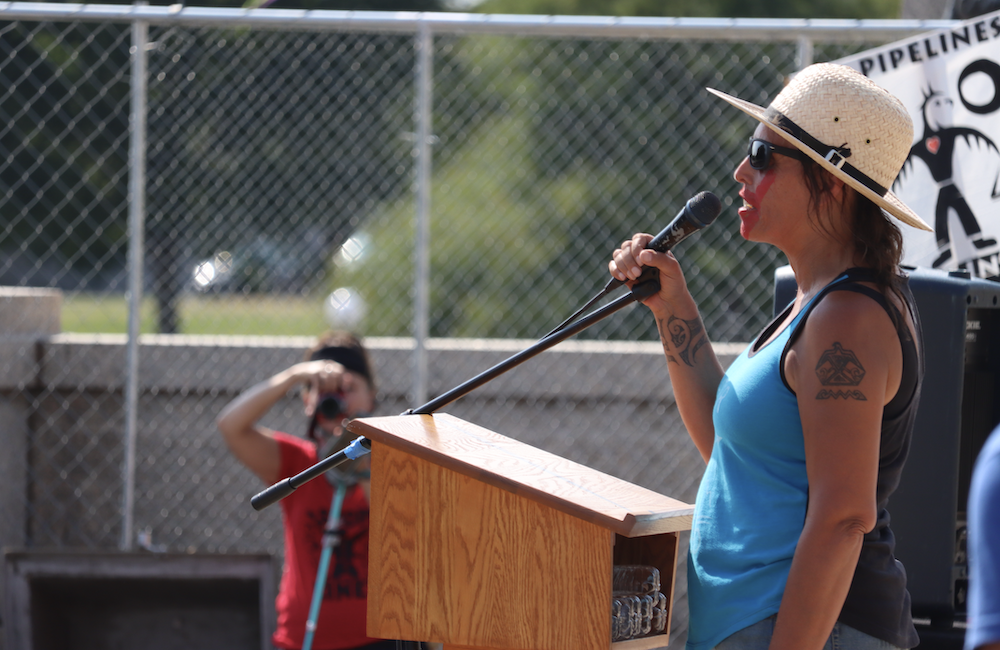
- Details
- By Darren Thompson
WADENA, Minn.—On Thursday, Wadena County dismissed all charges against activist Winona LaDuke for her role in protests against Enbridge’s Line 3 Expansion Oil Pipeline Project in Minnesota.
LaDuke, a White Earth Ojibwe citizen and former executive director of Honor the Earth, was arrested with six other women on July 19, 2021, for protesting in front of a Line 3 replacement site near the Shell River in Wadena County.
“I’m grateful, I was the last defendant on the river,” Winona LaDuke said in an interview with Native News Online. “We are still working to protect the Shell River from big agriculture and Enbridge.”
After her arrest, LaDuke spent three days behind bars because of a warrant issued by Aitkin County for violating conditions of release. She was previously arrested in Aitkin County on December 5, 2020 and was charged with two counts of misdemeanor trespass for participating in a prayer lodge on the shores of the Mississippi River. LaDuke was also arrested in Aitkin County on January 9, 2021 protesting at a Line 3 work site and posted bail with conditions to remain law-abiding.
LaDuke’s six co-defendants, stemming from the July 19, 2021 event, were dismissed by Wadena County in October and November 2022. LaDuke’s case remained open, however. She was the only American Indian citizen, and also appointed by the White Earth Band of Ojibwe as the guardian of the Shell River.
Yesterday’s news was the latest in a series of court wins for LaDuke. In April, Native News Online reported that Aitkin County dismissed two counts of criminal trespassing for lack of probable cause. In the last two weeks, several other people arrested for protesting the Line 3 construction recently had their cases dismissed in Aitkin County as well.
LaDuke still faces charges in Aitkin County related to the January 9, 2021, incident.
On Tuesday, April 25, 2023, Clearwater County dismissed all charges against the remaining 10 defendants arrested and charged at Camp Firelight, near the headwaters of the Mississippi River. An encampment there held ceremony for eight days near a Line 3 construction site until the Clearwater County Sheriff’s Office arrested 51 people.
“We will continue to stand for the river,” LaDuke said. Her attorney, Frank Bibeau, said that Minnesota tried to make an example out of LaDuke.
“Clearly the state was out to make an example of Winona, until it decided it wouldn’t, or couldn't,” Bibeau said. “We are celebrating yet another victory for those who protect our lands and waters where the Anishinabek have Treaty-protected rights.”
In its permitting process with the Minnesota Public Utilities Commission, Enbridge pledged to reimburse extra policing during the construction of the Line 3 Oil Pipeline Replacement Project. During the public commenting process, required for issuing permits for energy infrastructure projects in Minnesota, citizens feared a similar situation to protests against the Dakota Access Pipeline near the Standing Rock Indian reservation.
Both the Minnesota Department of Natural Resources and Aitken County Sheriff’s Office received at least $8.6 million in reimbursement funding for Line 3 policing. Nearly 900 people were arrested during the construction of Line 3, from December 2020 to October 2021.
“Prosecuting Line 3 Water Protectors has been an egregious waste of state resources,” Claire Glenn, one of LaDuke’s defense attorneys, said in a statement on Thursday. “In a time of so much need, it is shameful that our government would target and criminalize those working to protect all of us, and our precious waters, from the greed of a fossil fuel corporation.
“The State owes Ms. LaDuke and the hundreds of other Line 3 Water Protector defendants an apology.”
More Stories Like This
Gwich'in Tribal Governments Submit Comments Challenging Fish and Wildlife Service's Inadequate Environmental Review of Arctic Refuge Snow RoadRappahannock Tribe Challenges 9M-Gallon Water Plan
Feds release draft long-term plans for Colorado River management
Apache Leader Walks 60 Miles to Court Hearing That Will Decide Fate of Sacred Oak Flat
Rappahannock Tribe Raises Sovereignty and Environmental Concerns Over Caroline County Water Permit
Help us defend tribal sovereignty.
At Native News Online, our mission is rooted in telling the stories that strengthen sovereignty and uplift Indigenous voices — not just at year’s end, but every single day.
Because of your generosity last year, we were able to keep our reporters on the ground in tribal communities, at national gatherings and in the halls of Congress — covering the issues that matter most to Indian Country: sovereignty, culture, education, health and economic opportunity.
That support sustained us through a tough year in 2025. Now, as we look to the year ahead, we need your help right now to ensure warrior journalism remains strong — reporting that defends tribal sovereignty, amplifies Native truth, and holds power accountable.
 The stakes couldn't be higher. Your support keeps Native voices heard, Native stories told and Native sovereignty defended.
The stakes couldn't be higher. Your support keeps Native voices heard, Native stories told and Native sovereignty defended.
Stand with Warrior Journalism today.
Levi Rickert (Potawatomi), Editor & Publisher

